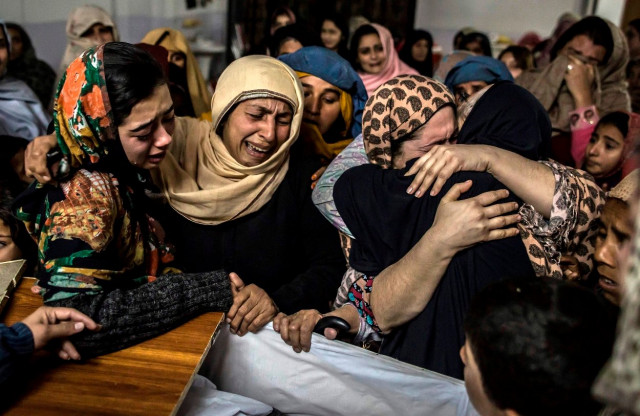Khyber-Pakhtunkhwa: Looking back at 2014
The tragedy of December 16, 2014 shows systemic failure; it did not ‘just happen’

That day angered and saddened almost everyone, everywhere, but for a few. The tragedy of December 16, 2014 shows the failure of this State as whole, with Pakistan Tehreek-e-Insaf-ruled Khyber-Pakhtunkhwa (K-P) as one part of it. It was a systemic failure and did not ‘just happen’. The perpetrators of the tragedy were not only the few who carried it out or their immediate leaders, pointing at the fast-growing irrelevancy of State and its writ; it was a failure of governance and all its parts: administrative, political, economic/developmental and socio cultural. PTI was voted in by the electorate of K-P largely due to their dissatisfaction with the inability of the outgoing government to arrest and correct the deteriorating governance of the province.
Administratively, PTI’s main slogan was ending corruption, with improved, people-friendly police and revenue departments—the thana and patwar—its poster children.
The answer to overall corruption has been appointment of a retired general to head the provincial NAB, and having a consultant for all projects and online bidding.
NAB has yet to show anything by way of nabbing any corrupt. Consultants are expected to serve as a check on both the contractor and the concerned government department. At this stage it has shown little impact on smaller projects, but on bigger ones, a contractor remarked, “I feed them, provide them an office and they use my laboratory.” Online bidding doesn’t fare better: smaller contracts competed on by larger bidders reduces the chance of collusion between them. But in case of big projects where you have a few pre-qualified contractors bidding, someone throws a lunch and the whole online system is bypassed.
Police stations have reportedly shown some improvement in better dealings with the public that approaches them and in some use of modern forensics and other equipment. However, skeptics counter this, labeling it as superficial and a result of heavy funding for training coming from international donors in counterterrorism support since 9/11.
The online FIR system may prove a good step in future; it is too soon to definitively say. In the revenue department, the change has been from demanding money to requesting it. Its computerization, started by the previous government, is yet to be completed.
Hospital reforms, yet another one of PTI’s flagship programmes, have included minor cleanliness and some improvement by way of availability of medicines. But ‘Sehat Ka Insaaf has just waned away, without much impact. There is no innovation in the much-needed polio eradication programme, carried out as always, by the bureaucracy.
Education has also not seen any impact of the ‘change’. English was announced as medium of instruction in all government schools, but there are few teachers available to teach any subject in it. The change which came was the controversial reversal of syllabi reforms introduced by the previous government and the reintroduction of the Ziaul Haq-era syllabus at the school level. The government has also failed to legislate amendments in universities’ governance proposed by its own commission.
The K-P government came up with a local bodies’ law in 2013, which has many merits, but has yet to hold elections under it. Imran Khan announced elections in November 2014. The Election Commission said this is not feasible and election can be held sometime in 2015.
On the developmental side, reportedly about 70% of the development budget lapsed in the government’s first year in office. Half way through the second year, it seemed we might see a repeat, but some projects have been started. The argument on government side for not spending earlier is that “We wanted a corruption-free system before launching new schemes.”
Politically, the provincial government has continuously changed its ministers. Some claim it’s a good sign as PTI is continuously monitors the performance of its ministers and makes changes whenever required. Its detractors call it instability and inability to decide.
Many of its detractors claim the PTI government in the province is actually being run from Bani Gala and Lahore. Direct intervention from outside the province and remote control governance is putting strains and stress on the party and government’s performance. However, PTI counters this by claiming the outside intervention to be exaggerated and to the level it takes place; it is welcome expert opinion and help.
Some provincial parliamentarians established a forward bloc within the party, which can create serious problems for it. A number of MNAs openly and some not so openly refused to tender resignations during the recent movements. The party’s approach to terrorism, broader law and order and the treatment of IDPs from the Federally Administered Tribal Areas has also not received very positive responses from most.
PTI’s performance also suffered during the dharna, as the chief minister and other leaders were busy outside the province and arranging for crowds to attend the sit-in in the federal capital. The dharna also took the attention of the public. People were busy discussing Nawaz Sharif, Lahore, Faisalabad and elections, and had no time to look at the issues of the province.
The PTI government did not blunder too seriously either. There were no major scandals doing the rounds privately or publicly. The biggest feather in its cap?
Professor Ijaz Khan works for the Department of International Relations, University of Peshawar and has authored the book Pakistan Strategic Culture and FP Making



















COMMENTS
Comments are moderated and generally will be posted if they are on-topic and not abusive.
For more information, please see our Comments FAQ